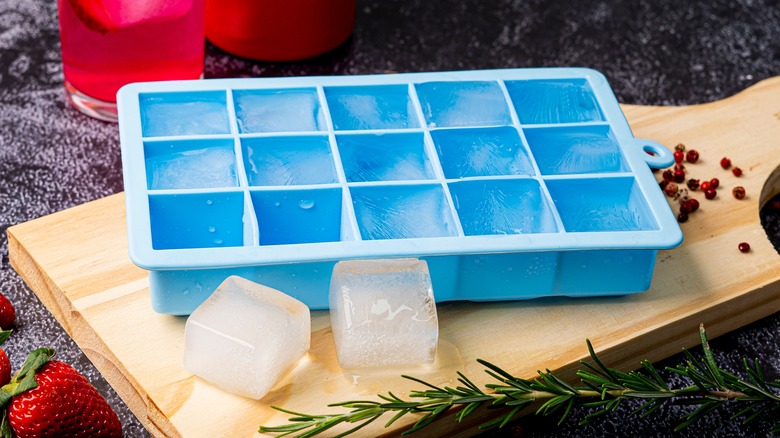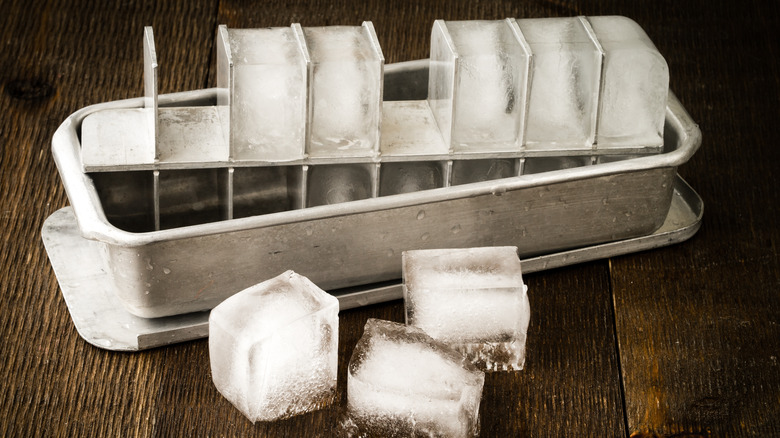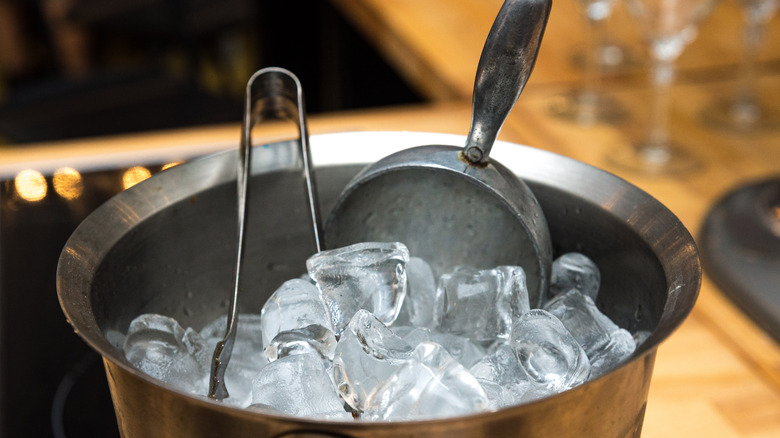How Long Ice Cubes Take To Freeze, And How To Make It Faster
The glacial pace at which ice freezes can feel like an eternity, especially when you really need those ice cubes but didn't plan ahead — or you did, but you thought they'd be done faster. A number of factors affect how long it takes for water to freeze, but in an average home freezer and using regular plastic ice cube trays, it will take from three to four hours to become frozen solid. There are ways to speed things up, however, and with a few tweaks, you can be sipping your preferred libation on the rocks in no time.
There are three main things that will determine how long it will take for the ice to freeze — the amount of water (less is more in this case), the material of the container being used (not plastic), and the temperature of both the water (hot) and freezer (cold). Home freezers are usually set to zero degrees Fahrenheit and water freezes at 32 degrees Fahrenheit, so logically, the colder the freezer, the faster anything inside will be frozen. If you need ice quickly, your first step should be to make sure your freezer is at the lowest setting, and if not, adjust it to as cold as it will go.
Your conductor matters
Another way to speed up the process is to use the right ice tray for the task. While the most common ice trays these days are either made of plastic or silicone, both these materials conduct heat slowly, which means it takes longer to chill the warmth out of your water. Metal and glass, on the other hand, will transfer heat faster. We've yet to see a functional and freezer-safe glass ice tray though, and considering that water expands as it freezes, using breakable glass for this purpose seems like a recipe for disaster. In contrast, metal ice trays may seem like a vintage ice box throwback, but they're actually quite functional and still readily available, mostly commonly made of aluminum or stainless steel. For the purpose of making cubes freeze faster, metal is your best choice.
One more trick is to reduce the size of what you're freezing — namely, use less water or smaller trays. This might sound counterintuitive to the goal of needing more ice, but it works. When you use smaller containers — for example, trays that make mini cubes instead of large blocks — the tiny ones will freeze more quickly, so just use more trays to get the quantity you need. Similarly, you can fill standard-size trays only partially full instead of all the way to the top.
How to speed it up
There's also an interesting method for accelerated freezing known as the Mpemba effect, which postulates that hot water freezes more rapidly than cold. You can try it by filling your ice trays with hot or boiling water. While the theory is somewhat controversial because of its unpredictability when tested in a controlled environment, it is generally accepted to be true that hot liquid will become ice faster than cold or room temperature. One possible explanation for this is that hot water evaporates faster in the chilled environment of a freezer, which in turn leaves less volume remaining to be frozen. As a bonus, this hot water hack is key for making crystal-clear ice cubes.
A few more things might also help to get those cubes clinking in your cocktail glasses sooner. Minimize how often the door is opened, or better yet, just don't open it for a while and let physics work its magic. Every time you open that door, you're letting hot air in, and there's no need for that when time is of the essence. We also know that during a power outage, how long frozen food lasts depends on how full the freezer is, so it follows that the more frozen stuff in there already, all that extra cold matter will help to freeze ice cubes quicker too.



